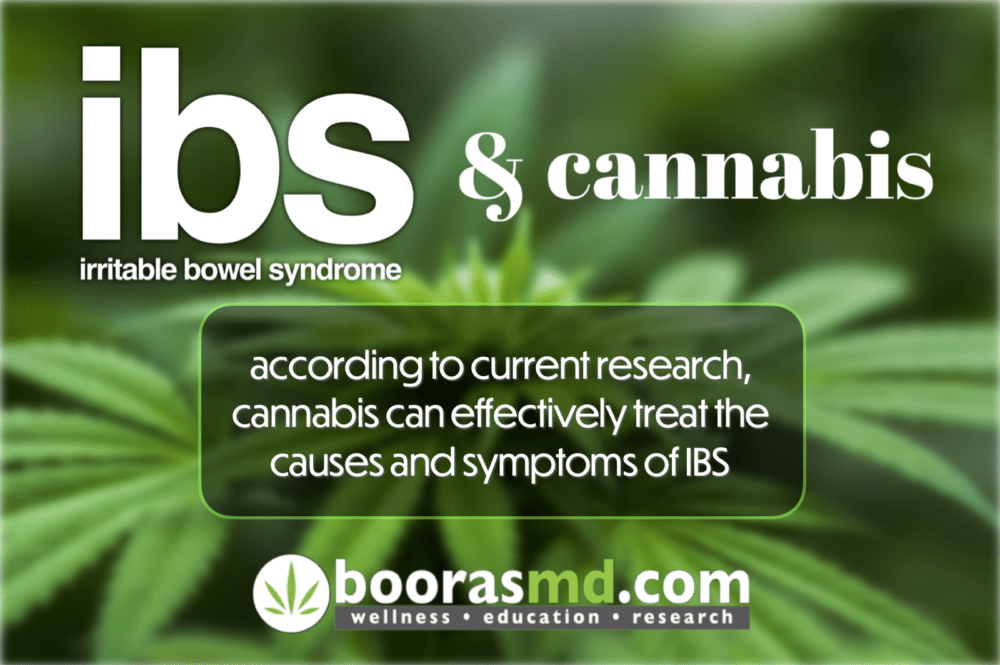Irritable Bowel Syndrome (IBS) and Medical Marijuana (Cannabis)
Irritable Bowel Syndrome (IBS) and Cannabis
Summary. Irritable Bowel Syndrome is a very common, but incurable, disorder primarily affecting the large intestine. It is the single most common functional gastrointestinal disorder with prevalence rates in the range of 10-15% of the entire world’s population! 60% of people have moderate or severe symptoms. It is estimated that the symptoms result in 2.4 to 3.5 million annual physician visits due to IBS!
https://www.aboutibs.org/facts-about-ibs/statistics.html
Symptoms can be very hard to control and include diarrhea and/or constipation, cramping, abdominal pain, bloating, gas, mucus in stool, weight loss along with sudden and intense urgency to defecate. Symptoms can be quite disruptive to a persons quality of life. The definitive cause of IBS has not yet been identified.
Many people with IBS also have upper gastrointestinal fullness, pressure, nausea and occasionally vomiting. This is referred to as dyspepsia.
***Cannabis works by activating the Endocannabinoid System (ECS), which exists in the body to help restore balance and homeostasis.***
This highly complex system is made up of 3 main components.
-
- Cannabinoids. Our body makes 2 different Endocannabinoids, Anandamide and 2-AG). Cannabis contains over 100 “Phytocannabinoids” that activate the ECS!
- Cannabinoid receptors. CB1 receptors are mostly in the brain and CB2 receptors exist primarily in the immune system and peripheral nervous system. There are receptors in the gut. The “Gut-Brain Axis” appears to be regulated by the Endocannabinoid System.
https://www.hopkinsmedicine.org/health/wellness-and-prevention/the-brain-gut-connection
https://www.healthline.com/nutrition/gut-brain-connection#TOC_TITLE_HDR_3
https://www.health.harvard.edu/diseases-and-conditions/the-gut-brain-connection - Enzymes to both create and break down Cannabinoids.
Esteemed researcher, Dr. Ethan Russo, has proposed that IBS is a Clinical Endocannabinoid Deficiency (like Fibromyalgia and Migraine).
https://pubmed.ncbi.nlm.nih.gov/18404144/
The Endocannabinoid System regulates the nerves controlling the gut. Activating the ECS can positively affect gut motility in addition to reducing gut sensitivity to pain, bloating, fullness and bowel irregularity. It also has a beneficial effect on the gut microorganisms (the microbiome) along with beneficial effects of reducing inflammation and protection from damage due to stomach acid.
There are beneficial effects from use of both THC and CBD, which work differently in the body.
THC reduces the hyperactive gut motility associated with diarrhea-predominant IBS.
CBD helps with visceral (abdominal) pain, in which is present in 70% of IBS patients. CBD also reduces anxiety.
“According to current research, cannabis can effectively treat a number of the underlying causes of IBS. This includes regulating the digestive system and decreasing intestinal inflammation. Similarly, cannabis can make up for endocannabinoid deficiencies that can trigger IBS. Finally, medical cannabis can help IBS patients cope with the pain, frustration, and depression that often accompanies the disorder.”
https://hightimes.com/health/can-treat-irritable-bowel-syndrome-cannabis/
https://www.tandfonline.com/doi/abs/10.1517/13543784.12.1.39
https://blog.sfgate.com/smellthetruth/files/2015/09/CBD-Patient-Survey-September2015.pdf
Written by Charlie Booras, MD on November 3, 2020




